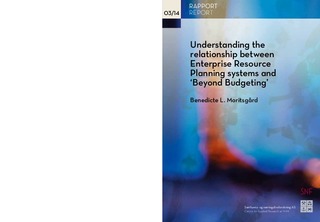| dc.contributor.author | Moritsgård, Benedicte L. | |
| dc.date.accessioned | 2015-04-27T11:06:16Z | |
| dc.date.available | 2015-04-27T11:06:16Z | |
| dc.date.issued | 2014-09 | |
| dc.identifier.isbn | 978-82-491-0862-6 (elektronisk versjon) | |
| dc.identifier.isbn | 978-82-491-0861-9 (trykt versjon) | |
| dc.identifier.issn | 0803-4036 | |
| dc.identifier.uri | http://hdl.handle.net/11250/282499 | |
| dc.description.abstract | Today, several companies are implementing Beyond Budgeting (BB) in order to become more flexible. At the same time, most companies also invest heavily in Enterprise Resource Planning systems (ERPs) because of a need for a standardized and stabile information system. By adopting a case study approach, this thesis aims at expanding our knowledge about the relationship between ERPs and BB. The study has been conducted in one of the leading oil and gas companies in Europe. The main findings of this study are that first, ERPs facilitate the implementation of the BB principles, i.e. transparency allowing companies to improve their communication and coordination leading to a stronger decentralization of organizations. Second, the ERPs act as a facilitator by providing organizations with more accurate and integrated data, which in turn improves the planning and resource allocation process. Third, Statoil solved the practical challenge of inflexibility and rigidity of ERPs by moving some parts of the management control system outside of the ERPs. To conclude, this case study has shown that ERPs can play an enabling role in implementing and making Beyond Budgeting ideas work in organizations. | nb_NO |
| dc.language.iso | eng | nb_NO |
| dc.publisher | SNF | nb_NO |
| dc.relation.ispartofseries | Report;2014:3 | |
| dc.title | Understanding the relationship between Enterprise Resource Planning systems and ‘Beyond Budgeting’ | nb_NO |
| dc.type | Research report | nb_NO |
| dc.subject.nsi | VDP::Social science: 200::Economics: 210::Business: 213 | nb_NO |
